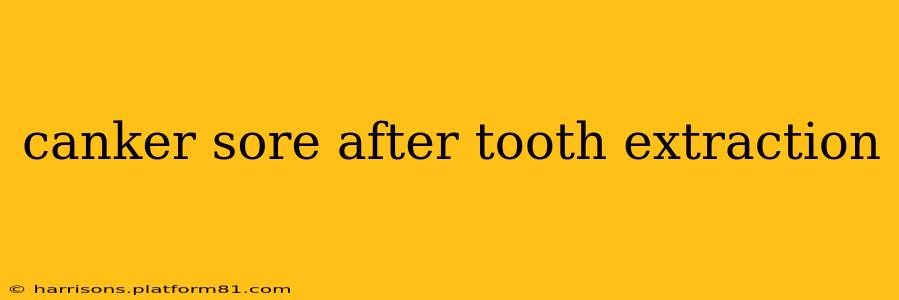A canker sore, also known as an aphthous ulcer, is a small, painful ulcer that can develop inside the mouth. While they're common, experiencing a canker sore after a tooth extraction can be particularly frustrating and concerning. This post will explore the potential causes, effective treatment options, and preventative measures to help you manage this painful complication.
Why Do I Have a Canker Sore After a Tooth Extraction?
The appearance of a canker sore following a tooth extraction isn't directly caused by the extraction itself, but rather by the trauma and subsequent healing process. Several factors can contribute:
-
Irritation: The extraction site is highly susceptible to irritation. The surgical instruments, stitches (if used), and the subsequent healing process can all trigger canker sore development. Even seemingly minor irritants like food particles or acidic drinks can exacerbate the issue.
-
Weakened Immune System: Major oral surgery, like a tooth extraction, can temporarily weaken your immune system. This makes you more vulnerable to infections and canker sores, which are often linked to immune system fluctuations.
-
Stress: The stress associated with the extraction procedure and recovery period can also play a role in triggering canker sores. Stress hormones can influence the body's immune response and increase susceptibility to these painful ulcers.
-
Oral Hygiene: Maintaining meticulous oral hygiene is crucial post-extraction. However, the healing process can make thorough cleaning difficult, potentially leading to bacterial build-up and increasing the risk of canker sores.
Is a Canker Sore After Tooth Extraction Normal?
While not inherently "normal," the occurrence of a canker sore after a tooth extraction isn't uncommon. Many people experience minor oral irritations during the healing process. However, if the canker sore is unusually large, persistent, or accompanied by other symptoms like fever or excessive swelling, it's crucial to consult your dentist or oral surgeon. This could indicate a more serious infection or complication.
How Can I Treat a Canker Sore After Tooth Extraction?
Treating a canker sore post-extraction requires a gentle approach to avoid disturbing the healing extraction site. Here are some effective strategies:
-
Over-the-counter remedies: Numerous topical pain relievers and anti-inflammatory gels are available without a prescription. These can significantly reduce pain and promote healing. Always follow the product instructions carefully.
-
Rinsing: Gentle rinsing with salt water (1/4 to 1/2 teaspoon of salt in 8 ounces of warm water) can help cleanse the area and reduce inflammation. Avoid harsh mouthwashes, as they can irritate the sore further.
-
Dietary adjustments: Soft foods are recommended to minimize irritation to the extraction site and the canker sore. Avoid acidic or spicy foods, as these can exacerbate pain.
-
Hydration: Staying well-hydrated is essential for overall healing and can help keep the mouth moist, promoting faster healing of the canker sore.
How Long Does a Canker Sore Last After a Tooth Extraction?
The duration of a canker sore after a tooth extraction varies depending on its severity and individual healing response. Most canker sores resolve within 7-10 days. However, if the sore persists for longer than two weeks, or if it's unusually large or painful, seek professional dental care.
Can I Prevent Canker Sores After a Tooth Extraction?
While it's not always possible to prevent canker sores entirely, taking proactive steps can significantly reduce your risk:
-
Maintain excellent oral hygiene: Brush gently but thoroughly, and floss carefully, avoiding the extraction site until it's fully healed.
-
Follow post-extraction instructions: Strictly adhere to your dentist's instructions regarding aftercare, including medication and dietary recommendations.
-
Manage stress: Employ stress-reduction techniques such as meditation, yoga, or deep breathing exercises.
-
Eat a balanced diet: A healthy diet rich in vitamins and minerals supports immune function and overall healing.
This information is for general knowledge and does not constitute medical advice. Always consult with your dentist or oral surgeon for any concerns regarding your oral health, particularly after a tooth extraction. They can provide personalized advice based on your individual circumstances and medical history.
